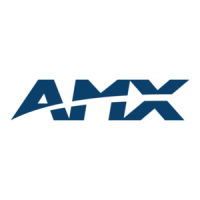Firmware Pages and Descriptions
113
Modero VG Series Touch Panels - Instruction Manual
Streaming Settings Page Elements (Cont.)
Video: This read-only field displays the video stream information (Video Streaming format and resolution).
• The properties of this incoming (detected) stream is given as: Video Codec and Resolution.
• An example would be: MPEG2 720x480. This means that the incoming video is an MPEG2 video stream with
resolution 720x480.
Codec • Supported MPEG codecs: MPEG-2 or MPEG-4
• MPEG-2 is typically used to encode audio and video for broadcast quality signals. The MPEG-2 is enhanced by
using MPEG-1's audio (MP2) component to allow the coding of audio programs with more than two channels.
Video quality is noticeably higher with MPEG-2 vs MPEG-4.
• MPEG-4 is currently used as a standard for the web (streaming media) and CD distribution, conversational
(videophone), and broadcast television. The biggest difference between these two encoding types is that
MPEG-4 uses about 1/3 to 1/2 less bandwidth for the same quality of video.
Resolution This relates to the display size/resolution used by the incoming video stream.
• Available resolutions: D1 (default) or SIF:
• D1 is a resolution standard. In the NTSC system, "Full D1" means 720x480 pixels @ 30 fps, and in PAL
systems, full D1 is 720x576 @ 24 fps.
• SIF (Source Interchange Format) is a resolution standard defined as 352x240 @ 30fps for NTSC and
352x288 @ 24 fps for PAL.
Scaling This is the ability of the Modero panel to scale the incoming NTSC or PAL video stream into the following pixel
resolutions:
•NTSC format:
- 12" VG Modero panel: 360x240 (SIF),720x480 (D1), and 800x600
- 15" VG Modero panel: 1024x768
- 17" VG Modero panel: 1280x768
•PAL format:
- 12" VG Modero panel: 360x288 (SIF),720x576 (D1), and 800x600
- 15" VG Modero panel: 1024x768
- 17" VG Modero panel: 1280x768
Audio: This read-only field displays the audio streaming information (Audio Streaming format, sampling rate, and
number of channels).
• The properties of this incoming (detected) audio stream is given as: Audio Codec, Sampling Rate, and Audio
Channels.
• An example would be: MP3 44100Hz 2Ch. This means that the accompanying audio stream is using a 2
channel, MP3 audio stream with sampling rate of 44100 Hz.
Codec Supported audio codecs: AAC, MP2 or MP3
• AAC (Advanced Audio Coding) is a digital audio encoding and loss compression format. AAC was designed as
an improved-performance codec relative to MP3 (which was specified in MPEG-1) and MPEG-2 Part 3 (which
is also known as "MPEG-2 Audio" or ISO/IEC 13818-3).
• MP2 (MPEG Audio Layer-2) is used as a f ile extension for files containing audio data of this type. It remains a
dominant standard for audio broadcasting. This file type allows the coding of audio programs with more than
two channels. The main difference between these two types is that MP2 audio files are generally larger than
their MP3 counterparts and are mostly used with MPEG-2 video streams.
Note: MP2 is recommended for use with a high bandwidth video stream (ex: MPEG-4 or 6 Mbps - 3 Mbps).
• MP3 (MPEG Audio Layer-3) is a popular digital audio encoding and loss compression format. It was designed
to greatly reduce the amount of data required to represent the original audio data, yet still sound like a
faithful reproduction of the original uncompressed audio to most listeners.
Note: MP3 is recommended for use with a low bandwidth video stream (ex: MPEG-2 or < 3 Mbps).
Sampling Rate This is the sampling rate used by the incoming audio stream.
• Sampling rate defines the number of samples per second taken from a continuous signal to make it a
discrete signal.
• Rate is measured in KHz (KiloHertz).
• Available audio sampling rates: 32KHz, 44.1KHz, and 48KHz.
• Some of the common uses for these rates include:
- 32,000 KHz - miniDV digital video camcorder
- 44,100 KHz - compact disc, also most commonly used with MPEG-1 audio (VCD, SVCD, MP3)
- 48,000 KHz - digital sound used for digital TV, DVD, DAT, films and professional audio
Note: Currently, 32KHz is not supported within the Modero firmware.
Audio Channels The number of audio channels encoded within the incoming audio stream.
• Modero only supports 2CH (2 channel) audio.
Brightness: Use the UP/DN buttons to alter the brightness level of the incoming signal.
• Range = 0 - 255, default = 128.
Contrast: Use the UP/DN buttons to alter the contrast level of the incoming signal.
• Range = 0 - 255, default = 128.

